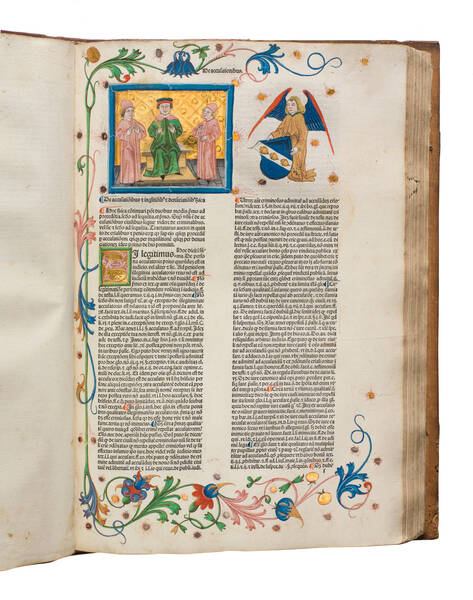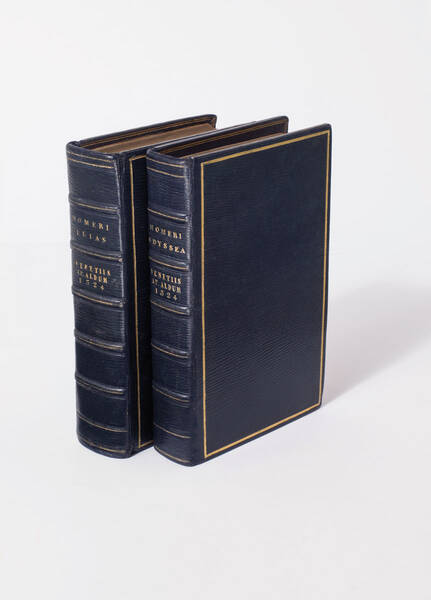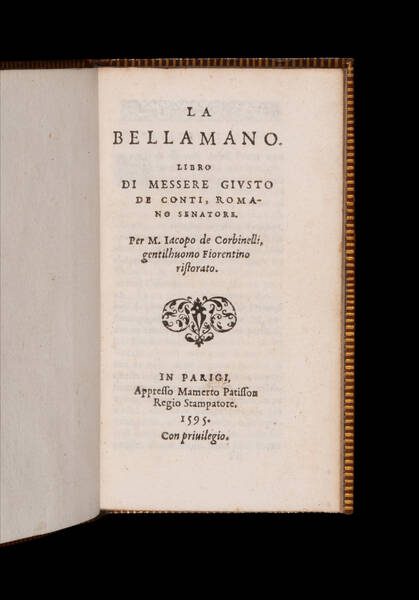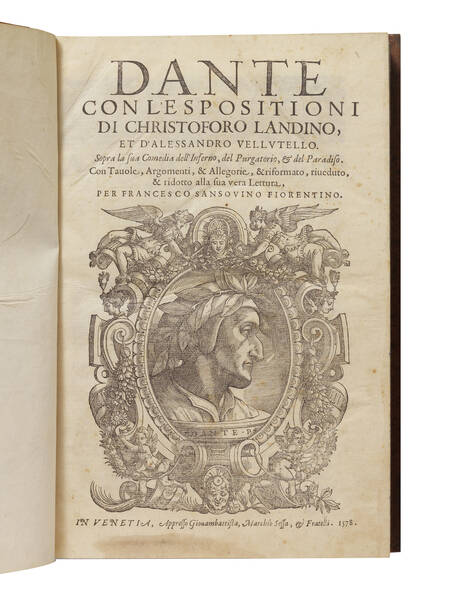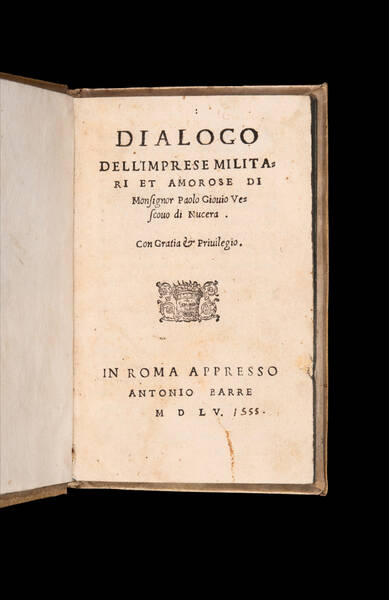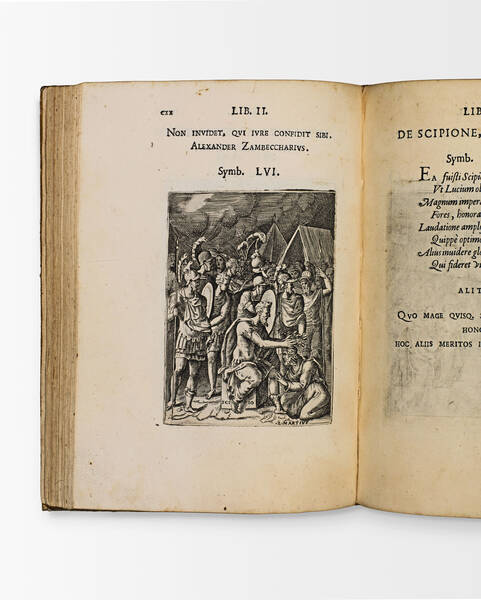RUSCELLI, Gerolamo. Le imprese illustri con espositioni, et discorsi del s.or Ieronimo Ruscelli.
Venice, Francesco Rampazetto., 1566.Quarto (262 x 190 mm.), three parts in one volume: [20] 212 [4] 213-231 [1] 233-240 [4] 241-443 [i.e. 344] 345-352 [4] 353-398 [18] 401-566 [2] pp. With 3 engraved titles, a full page portrait of Ruscelli engraved by Niccolò Nelli dated 1566, 5 double-page engraved plates, 15 full-page engraved plates, 114 engraved vignettes, numerous woodcut initials, woodcut printer's device at end. A few spots, scattered foxing, light browing here and there; a very good copy in early eighteenth century stiff vellum, manuscript title on spine. Provenance: De Marinis ´pencil note); Arrigo Castellani (ex libris).
First edition of the first emblem book illustrated with engravings, one of the finest emblem books of the XVI century. ‘Sixteenth-century imprese have been identified as an expression of early modern individuality. Paolo Giovio, the first author who composed a treatise dedicated entirely to imprese considered them “personal devices, relating to some aspects of the bearer's personality and virtue” a description which “fits easily both into [Giovio's] own historical focus on individual and in the courtly environment of flattery and praise” (Caldwell). Indeed, Giovio considered the impresa analogous to a portrait. Following Giovio's assimilation of the impresa to a portrait Alan Young defines the device as a “self-portrait, a projection of the self in terms of personal terms and goals, private principles, feelings and state of minds”. Dorigen Caldwell argues that sixteenth-century imprese expressed one's individuality within the context of courts, accademie and the humanistic centres in which their creators lived and operated […] and that the impresa was an expression of both individuality - of the innermost thoughts and feelings, the intellectual personality of sixteenth-century Italian men and women – and of the courtly, academic, humanistic and vernacular culture in which the lived. The performative nature of the impresa implied a public that perceived the images and words of the device as metonymies for the individual's noblest virtues. The carriers of the impresa chose and organized (or has someone organize for them) the qualities that would make them noble and unique through the structure of the impresa. Members of the Italian accademie which burgeoned in the second half of sixteenth-century counted among their members intellectuals, professors and noblemen. They were the authors of the imprese which they created for their accademie and for themseves. These imprese “ gave the members […] a sense of belonging while simultaneously excluding outsiders” (Caldwell). By looking at a specific impresa the audience – either a group of people such as the member of an accademia or simply another person, distinct from the subject of the device – interpreted the device and made assumptions about the subject's individuality. […] Gerolamo Ruscelli was born in Viterbo at the beginning of the sixteenth-century and died in Venice in 1566. He lived in Rome until 1548, before moving to Venice, where he played an important role in the printing industry. While in Rome, in 1541, he founded the Accademia dello Sdegno together with Tommaso Spica and Giovanni Andrea dell'Anguillara. He edited the works of Boccaccio, Petrarch and Ariosto and translated Claudius Ptolomaeus's treatise on geography. While in Venice he had contacts with other academies – della Fratta, dei Dubbiosi, della Veniera and della Fama – and was interested in issues such as the systematization of Italian language and imprese, which were commonly debated in the academies. In 1556, he edited Giovio's Dialogo and included in this edition his Discorso on imprese. In 1566, the year he died, Francesco Rampazzetto printed his treatise Le imprese illustri in Venice. In the dedicatory letter to the ‘Catholic King Philip II of Spain', Ruscelli declares that his goal in writing this treatis was to produce a text that could live ‘eternally in the eyes, ears, tongues, souls and memory of every truly noble and gentle spirit of men and women, both learned or ignorant, but especially of Princes […]. From this dedicatory letter Le imprese illustri appears to be a very different text from Ruscelli's Discorso printed in 1556, which was a theoretical treatise on the nature, goal and structure of the impresa. Le imprese illustri is a long and exhaustive desciption of devices for powerful and learned men and women accompanied by beautiful illustations'. (M. Calabritto, Women's imprese in Girolamo Ruscelli's Le imprese illustri 1566. Glasgow: Glasgow Emblem Studies, 2007)
Berlin Kat. 4512; Praz, 17th-Century Imagery II, p.145.
Other Books
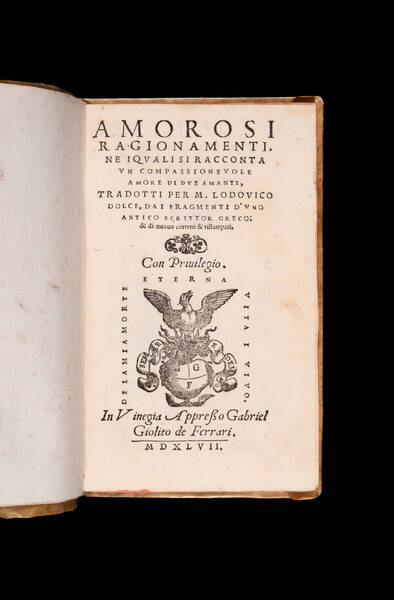
[ACHILLES TATIUS]
Amorosi ragionamenti ne i quali si racconta un compassionevole amore di due amanti, tradotti per m. Lodovico Dolce.
€ 600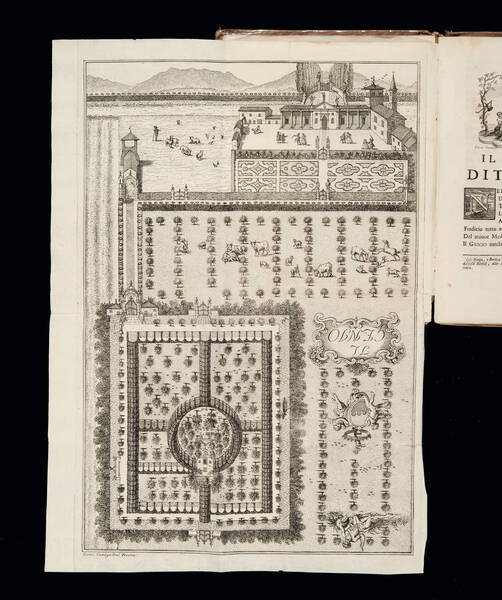
ACANTI, Aureliano (CANATI, Valeriano)
Il Roccolo ditirambo di Valeriano Acanti Acc. Olimpico Vicentino.
€ 5.000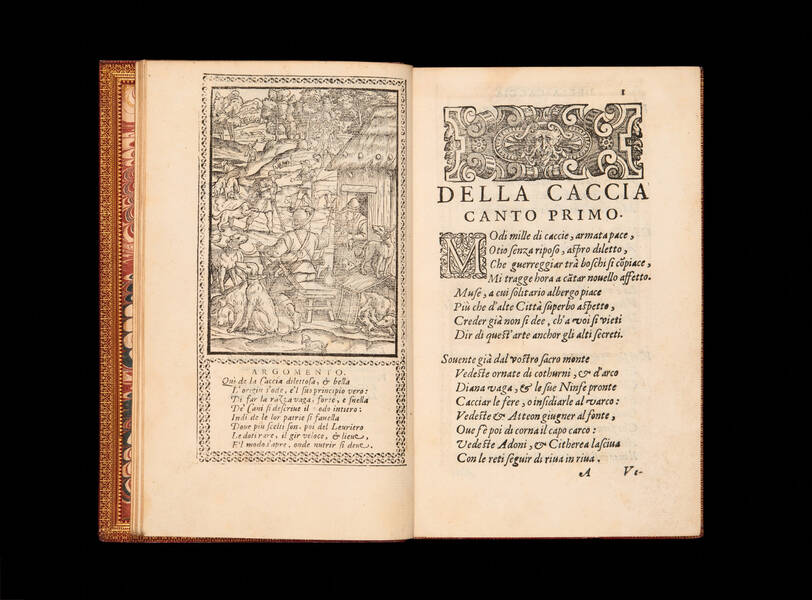
VALVASONE, Erasmo da
Della caccia poema del signor Erasmo di Valuasone. All'ill. signor Cesare di Valuasone suo nepote. Con gli argomenti a ciascun canto del sig. Gio....
€ 3.500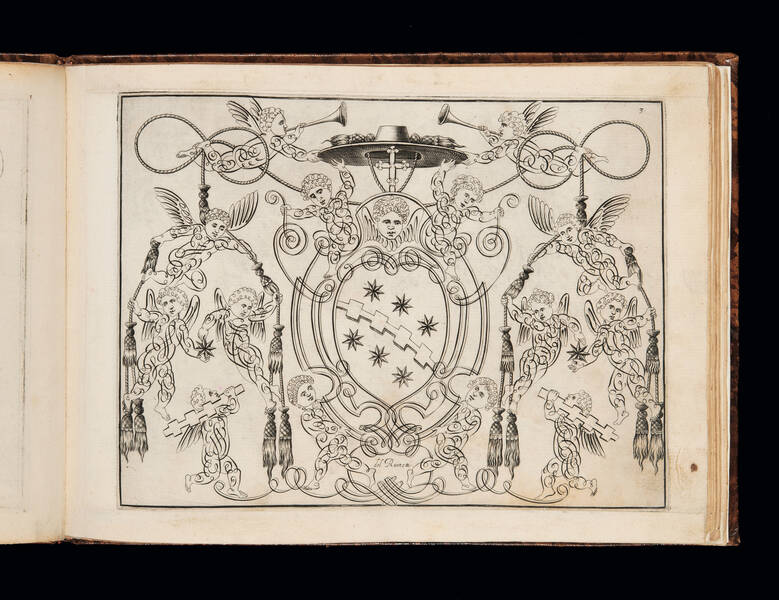
RUINETTI, Tomaso
Idea del buon scrittore, opera prima di Tomaso Ruinetti da Ravena a’beneficio de’desiderosi d’imitare le vere forme dello scrivere.
€ 8.000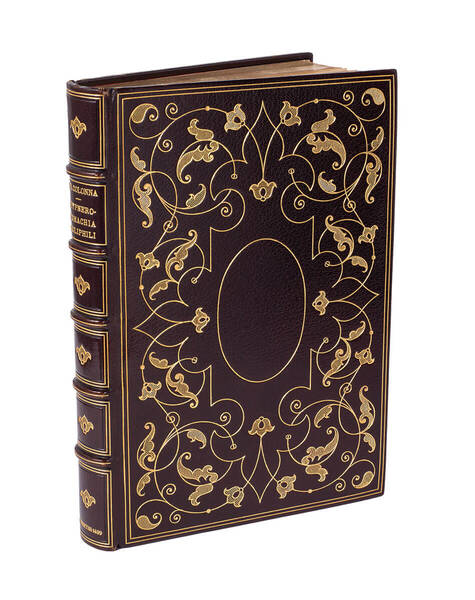
COLONNA, Francesco
Hypnerotomachia Poliphili, ubi humana omnia non nisi somnium esse docet atque obiter plurima scitu sanequam digna commemorat.
SOLD OUT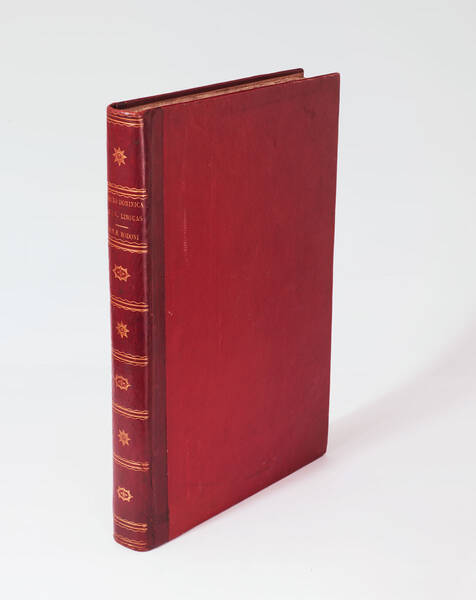
[BODONI]
Oratio Dominica in CLV linguas versa et exoticis characteribus plerumque expressa.
SOLD OUT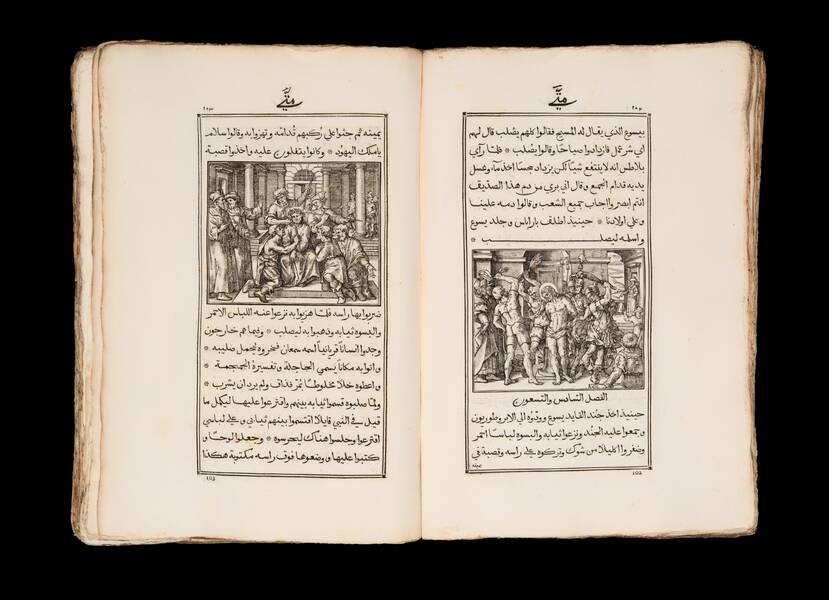
[BIBLIA ARABICA]
Evangelium Sanctum Domini nostri Iesu Christi conscriptum a quatuor Evangelistis sanctis, id est Matthaeo, Marco, Luca et Iohanne.
SOLD OUT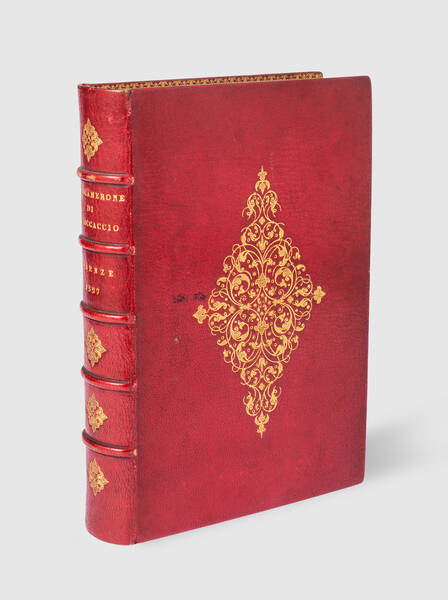
BOCCACCIO, Giovanni
Il Decamerone di m. Giouanni Boccaccio nuouamente corretto et con diligentia stampato.
SOLD OUT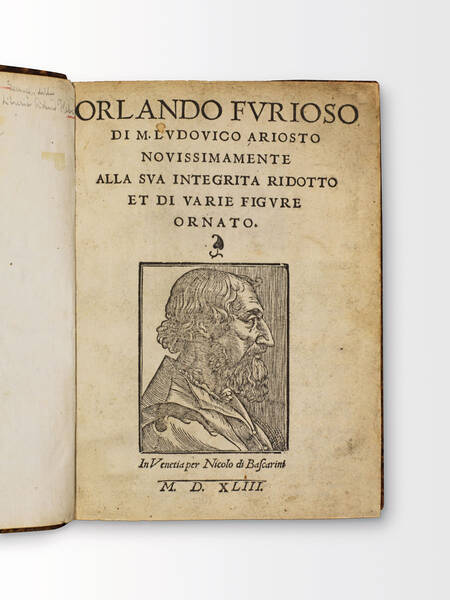
ARIOSTO, Ludovico
Orlando Furioso di M. Ludovico Ariosto novissimamente alla sua integrità ridotto et di varie figure ornato.
SOLD OUTMEDA RIQUIER rare books ltd.
4 Bury Street St James's
SW1Y 6AB London
Phone +44 (0) 7770457377
info@medariquier.com
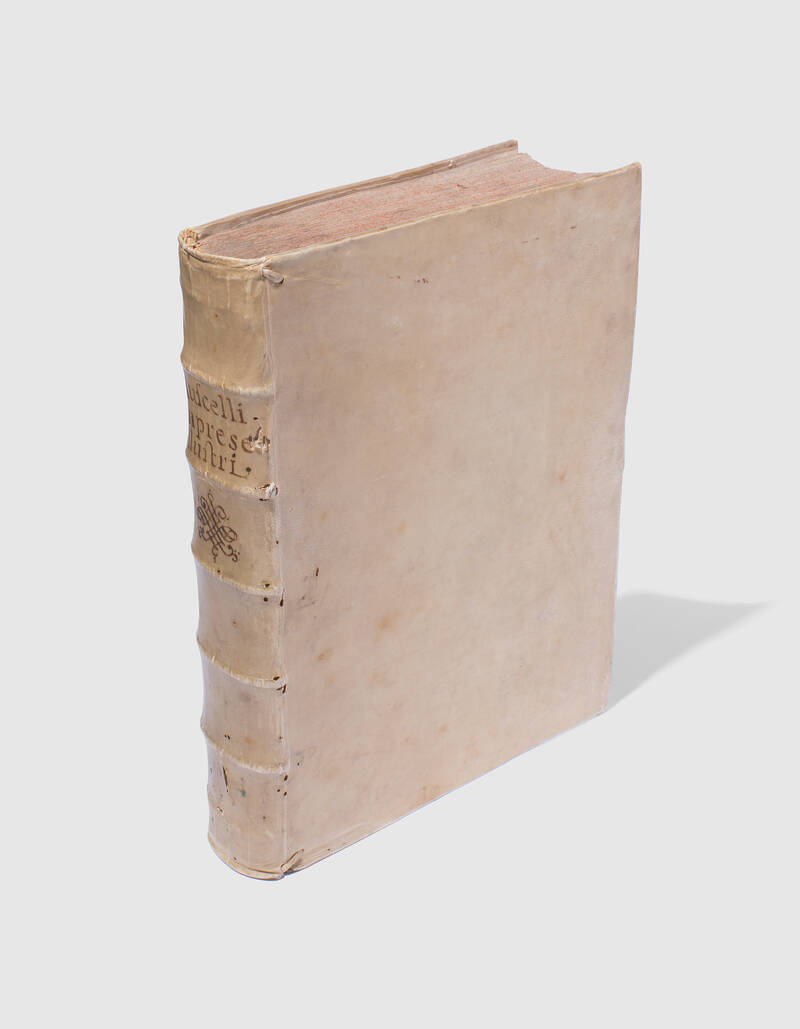
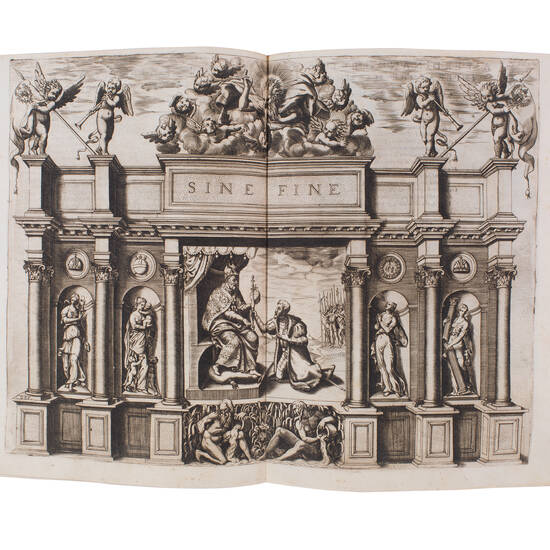
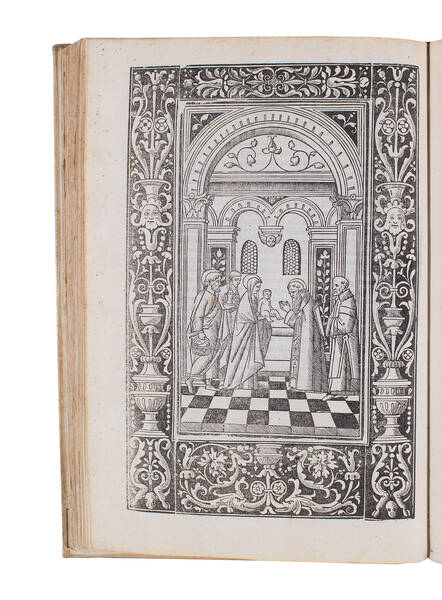
![[Life of the Virgin Mary] [Life of the Virgin Mary]](https://www.medariquier.com/typo3temp/pics/cbb0f7a08f.jpeg)

